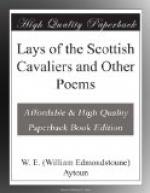To the last, his heart was with Scotland. The following anecdote was related by his brother, Cardinal York, to Bishop Walker, the late Primus of the Episcopal Church of Scotland:—“Mr. Greathead, a personal friend of Mr. Fox, succeeded, when at Rome in 1782 or 1783, in obtaining an interview with Charles Edward; and, being alone with him for some time, studiously led the conversation to his enterprise in Scotland, and to the occurrences which succeeded the failure of that attempt. The Prince manifested some reluctance to enter upon these topics, appearing at the same time to undergo so much mental suffering, that his guest regretted the freedom he had used in calling up the remembrance of his misfortunes. At length, however, the Prince seemed to shake off the load which oppressed him; his eye brightened, his face assumed unwonted animation, and he entered upon the narrative of his Scottish campaigns with a distinct but somewhat vehement energy of manner—recounted his marches, his battles, his victories, his retreats, and his defeats—detailed his hairbreadth escapes in the Western Isles, the inviolable and devoted attachment of his Highland friends, and at length proceeded to allude to the terrible penalties with which the chiefs among them had been visited. But here the tide of emotion rose too high to allow him to go on—his voice faltered, his eyes became fixed, and he fell convulsed on the floor. The noise brought into his room his daughter, the Duchess of Albany, who happened to be in an adjoining apartment. ‘Sir,’ she exclaimed, ’what is this? You have been speaking to my father about Scotland and the Highlanders! No one dares to mention those subjects in his presence.’”
He died on the 30th of January, 1788, in the arms of the Master of Nairn. The monument erected to him, his father, and brother, in St. Peter’s, by desire of George IV., was perhaps the most graceful tribute ever paid by royalty to misfortune—REGIO CINERI PIETAS REGIA.
CHARLES EDWARD AT VERSAILLES
ON THE ANNIVERSARY OF CULLODEN




